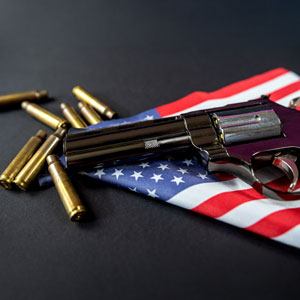 Guns are an integral part of many Texas families’ traditions and identities. However, it’s important to handle firearms responsibly and follow the laws in place to ensure everyone’s safety. Failing to do so can lead to serious consequences, including weapon-related charges, which may require the assistance of a skilled lawyer.
Guns are an integral part of many Texas families’ traditions and identities. However, it’s important to handle firearms responsibly and follow the laws in place to ensure everyone’s safety. Failing to do so can lead to serious consequences, including weapon-related charges, which may require the assistance of a skilled lawyer.
Keep reading to learn more about…
- The different types of weapon offenses in Texas.
- The legal consequences for illegal possession, unlawful carry, and disorderly conduct charges.
- What you can expect from the court process, and why you’ll want a lawyer with firearm experience on your side.
What Are The Different Types Of Weapons Offenses In Texas?
Under Texas law, there are several weapons-related offenses you can be charged with, many of which you may not even be aware of. These offenses fall into a few key categories.
The first category involves possessing a weapon when you’re not legally allowed to. For example, if you are a convicted felon, a member of a criminal street gang, have been convicted of a misdemeanor crime of family violence, or are under an emergency protective order that prohibits gun ownership, possessing a firearm would be illegal. There are also other prohibited categories that make firearm possession a crime.
Another category of charges can arise if you legally own the weapon but carry it into a location where firearms are not permitted. These places include schools, courthouses, polling places during voting, and any location where alcohol is sold for on-premises consumption. Many people are unaware that entering these restricted areas with a gun constitutes a crime.
A third type of offense involves possessing a prohibited weapon, such as a sawed-off shotgun, a hoax bomb, or an incendiary device. These items are strictly prohibited under Texas law, and possession of such weapons can lead to serious charges.
Lastly, charges can stem from using a weapon in a manner that is prohibited. This includes actions such as discharging a firearm within city limits, firing a weapon at someone, or threatening someone with a weapon. These behaviors violate state law and can result in significant legal consequences.
In addition to these general categories, there are other specialized charges, such as smuggling weapons through straw purchases or other specific illegal activities involving guns or other weapons. These laws cover a broad range of conduct, so it’s important to be aware of the potential legal risks.
What Are The Potential Consequences Of An Illegal Possession Charge In Texas?
The punishment for a conviction for illegal possession depends on the reason you are prohibited from owning the weapon.
If you are not allowed to have a firearm because you are a felon, then illegal possession becomes a third-degree felony. On the other hand, if you are under a protective order, among other categories, illegal possession is only a misdemeanor case.
While the felon found in possession of a firearm will face two to ten years, the misdemeanor charges vary pretty widely. They are typically class A misdemeanors, but the exact penalties can depend on the circumstances as well.
What Are The Potential Consequences Of An Unlawful Carry Charge In Tarrant County?
In Texas, the law now allows constitutional carry, meaning you can legally carry a firearm without a license as long as you’re not a prohibited person or in a prohibited place. However, the firearm must be concealed. If you wish to carry openly, you still need a license. If you’re caught carrying a firearm in plain view without the required license, you could face an unlawful carry charge.
Another situation that can lead to an unlawful carry charge occurs when someone is otherwise lawfully carrying a firearm but commits a crime. For example, if you have a gun in your glove box (which is legal), but you’re arrested for driving while intoxicated (DWI), the lawful carry can convert into an unlawful carry charge due to the criminal activity.
Typically, an unlawful carry charge is a Class A misdemeanor, but penalties can vary depending on the specific circumstances of the case.
What Are The Potential Consequences Of A Conviction For Disorderly Conduct Involving A Weapon?
If you cause a disruption with your firearm, such as displaying or discharging it in a way that causes alarm, you could be charged with disorderly conduct involving a weapon.
This offense is generally classified as a Class B misdemeanor. However, if you discharge the firearm toward a vehicle, building, or person, the charge escalates to deadly conduct, which is a felony carrying much more severe penalties.
What Can I Expect When Charged With A Weapons Offense In Tarrant County, TX?
While the legal process for weapons offenses follows the same basic structure as other criminal charges, there are some important distinctions. Weapons offenses often raise concerns about public safety, so judges may set higher bonds compared to other charges. You may also be required to check in with pretrial supervision, even before a conviction.
Additionally, while some misdemeanors, such as drug possession, may be dismissed more readily by prosecutors, weapons-related misdemeanors are treated more seriously. Prosecutors are typically less inclined to dismiss these cases, making it more challenging to secure a dismissal or a favorable plea deal.
This is why it’s crucial to have an attorney with experience in weapons-related charges and a strong understanding of firearm laws to guide you through the process and advocate on your behalf.
Why Is It Important To Work With An Attorney Who Has Specific Experience Handling Weapons-Related Charges?
Weapons charges often involve complex exceptions and justifications that can make what seems like an unlawful act legally justified. One of the most significant exceptions is self-defense or defense of others.
For example, you’re not allowed to point a gun at someone and order them to raise their hands—unless that person is about to attack you with a weapon like a baseball bat.
While this example may seem clear-cut, self-defense is a highly nuanced and fact-specific area of law in practice. Each case depends heavily on the details of the situation, and having an attorney who deeply understands the subtleties of self-defense can make a significant difference. Without this expertise, you may miss critical opportunities to assert a valid defense.
Weapons-Charge Case Study: Firearms Knowledge Can Make A World Of Difference
In one case we handled, a client was facing life in prison after being accused of shooting at a police officer from inside his trailer. Thanks to our in-depth knowledge of firearms, we noticed multiple discrepancies in the police’s version of events.
For instance, if the shot had been fired the way the police claimed, there should have been specific evidence—such as unburned gunpowder or stippling marks from the shot passing through a nearby wall—but none of these were present.
This was just one of many critical inconsistencies that helped us build a strong defense. These details would likely have been missed by someone unfamiliar with firearms, and even if found, may not have been effectively presented to a jury without the right expertise. Our ability to challenge the evidence in the face of expert testimony was essential to securing a favorable outcome.
Why Are We Uniquely Qualified To Assist You With Firearms Cases?
Beyond my legal experience, my background includes extensive knowledge of firearms and self-defense laws. I have a military background, and I also ran a firearms training company for several years, offering courses on basic gun safety, self-defense, and competitive shooting. Additionally, I have served as a Texas License to Carry instructor and am certified by the NRA as a firearms instructor and range safety officer.
Having completed over 300 hours of firearms and shooting training from some of the top professionals in the country, I am well-versed in the technical aspects of firearms, as well as the legal framework surrounding their use in self-defense.
This knowledge allows me to examine cases with a level of insight that many others lack. It helps us identify key pieces of evidence, ask the right questions, and present a compelling defense – and it is one reason we’ve had so much success in handling weapons-related and self-defense cases.
Have you or someone you loved been accused of a weapon offense in Texas?
For more information on Charged With A Weapons Offense In Texas, an initial consultation is your next best step. Get the information and legal answers you are seeking by calling (888) 694-7006 today.
